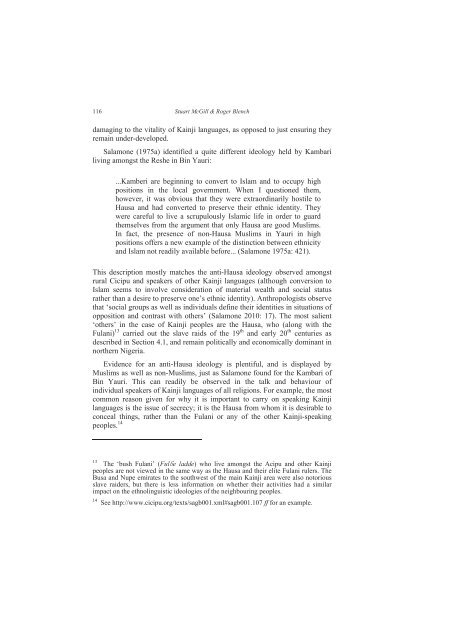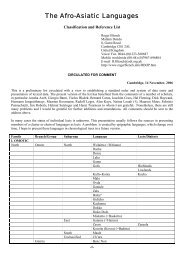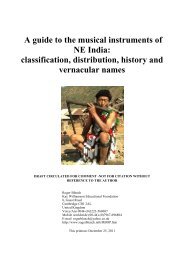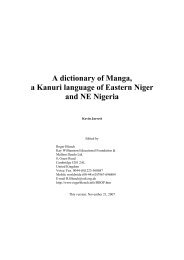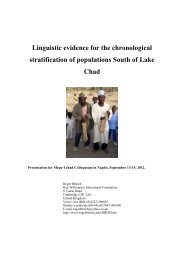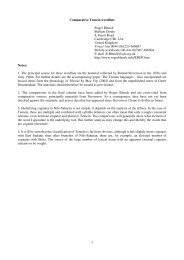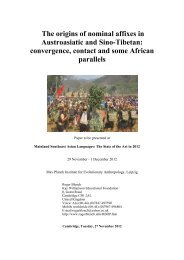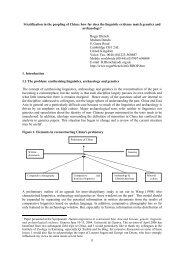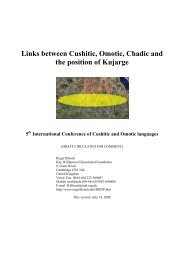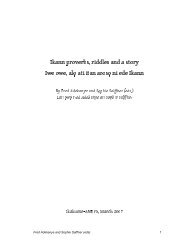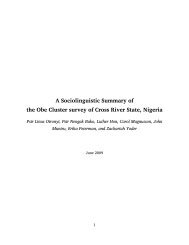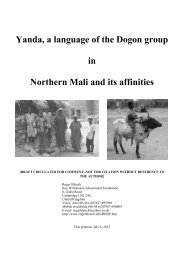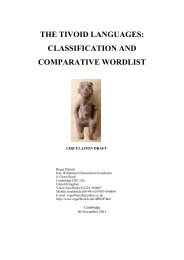Documentation, development, and ideology in the ... - Roger Blench
Documentation, development, and ideology in the ... - Roger Blench
Documentation, development, and ideology in the ... - Roger Blench
You also want an ePaper? Increase the reach of your titles
YUMPU automatically turns print PDFs into web optimized ePapers that Google loves.
116<br />
Stuart McGill & <strong>Roger</strong> <strong>Blench</strong><br />
damag<strong>in</strong>g to <strong>the</strong> vitality of Ka<strong>in</strong>ji languages, as opposed to just ensur<strong>in</strong>g <strong>the</strong>y<br />
rema<strong>in</strong> under-developed.<br />
Salamone (1975a) identified a quite different <strong>ideology</strong> held by Kambari<br />
liv<strong>in</strong>g amongst <strong>the</strong> Reshe <strong>in</strong> B<strong>in</strong> Yauri:<br />
...Kamberi are beg<strong>in</strong>n<strong>in</strong>g to convert to Islam <strong>and</strong> to occupy high<br />
positions <strong>in</strong> <strong>the</strong> local government. When I questioned <strong>the</strong>m,<br />
however, it was obvious that <strong>the</strong>y were extraord<strong>in</strong>arily hostile to<br />
Hausa <strong>and</strong> had converted to preserve <strong>the</strong>ir ethnic identity. They<br />
were careful to live a scrupulously Islamic life <strong>in</strong> order to guard<br />
<strong>the</strong>mselves from <strong>the</strong> argument that only Hausa are good Muslims.<br />
In fact, <strong>the</strong> presence of non-Hausa Muslims <strong>in</strong> Yauri <strong>in</strong> high<br />
positions offers a new example of <strong>the</strong> dist<strong>in</strong>ction between ethnicity<br />
<strong>and</strong> Islam not readily available before... (Salamone 1975a: 421).<br />
This description mostly matches <strong>the</strong> anti-Hausa <strong>ideology</strong> observed amongst<br />
rural Cicipu <strong>and</strong> speakers of o<strong>the</strong>r Ka<strong>in</strong>ji languages (although conversion to<br />
Islam seems to <strong>in</strong>volve consideration of material wealth <strong>and</strong> social status<br />
ra<strong>the</strong>r than a desire to preserve one’s ethnic identity). Anthropologists observe<br />
that ‘social groups as well as <strong>in</strong>dividuals def<strong>in</strong>e <strong>the</strong>ir identities <strong>in</strong> situations of<br />
opposition <strong>and</strong> contrast with o<strong>the</strong>rs’ (Salamone 2010: 17). The most salient<br />
‘o<strong>the</strong>rs’ <strong>in</strong> <strong>the</strong> case of Ka<strong>in</strong>ji peoples are <strong>the</strong> Hausa, who (along with <strong>the</strong><br />
Fulani) 13 carried out <strong>the</strong> slave raids of <strong>the</strong> 19 th <strong>and</strong> early 20 th centuries as<br />
described <strong>in</strong> Section 4.1, <strong>and</strong> rema<strong>in</strong> politically <strong>and</strong> economically dom<strong>in</strong>ant <strong>in</strong><br />
nor<strong>the</strong>rn Nigeria.<br />
Evidence for an anti-Hausa <strong>ideology</strong> is plentiful, <strong>and</strong> is displayed by<br />
Muslims as well as non-Muslims, just as Salamone found for <strong>the</strong> Kambari of<br />
B<strong>in</strong> Yauri. This can readily be observed <strong>in</strong> <strong>the</strong> talk <strong>and</strong> behaviour of<br />
<strong>in</strong>dividual speakers of Ka<strong>in</strong>ji languages of all religions. For example, <strong>the</strong> most<br />
common reason given for why it is important to carry on speak<strong>in</strong>g Ka<strong>in</strong>ji<br />
languages is <strong>the</strong> issue of secrecy; it is <strong>the</strong> Hausa from whom it is desirable to<br />
conceal th<strong>in</strong>gs, ra<strong>the</strong>r than <strong>the</strong> Fulani or any of <strong>the</strong> o<strong>the</strong>r Ka<strong>in</strong>ji-speak<strong>in</strong>g<br />
peoples. 14<br />
13<br />
The ‘bush Fulani’ (Fule ladde) who live amongst <strong>the</strong> Acipu <strong>and</strong> o<strong>the</strong>r Ka<strong>in</strong>ji<br />
peoples are not viewed <strong>in</strong> <strong>the</strong> same way as <strong>the</strong> Hausa <strong>and</strong> <strong>the</strong>ir elite Fulani rulers. The<br />
Busa <strong>and</strong> Nupe emirates to <strong>the</strong> southwest of <strong>the</strong> ma<strong>in</strong> Ka<strong>in</strong>ji area were also notorious<br />
slave raiders, but <strong>the</strong>re is less <strong>in</strong>formation on whe<strong>the</strong>r <strong>the</strong>ir activities had a similar<br />
impact on <strong>the</strong> ethnol<strong>in</strong>guistic ideologies of <strong>the</strong> neighbour<strong>in</strong>g peoples.<br />
14 See http://www.cicipu.org/texts/sagb001.xml#sagb001.107 ff for an example.


